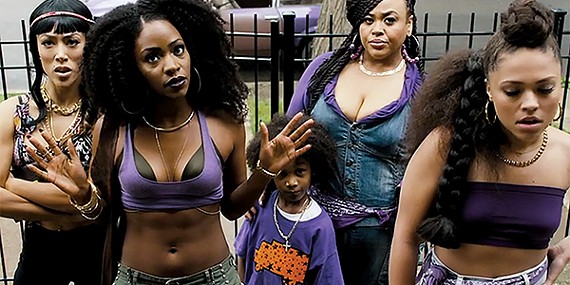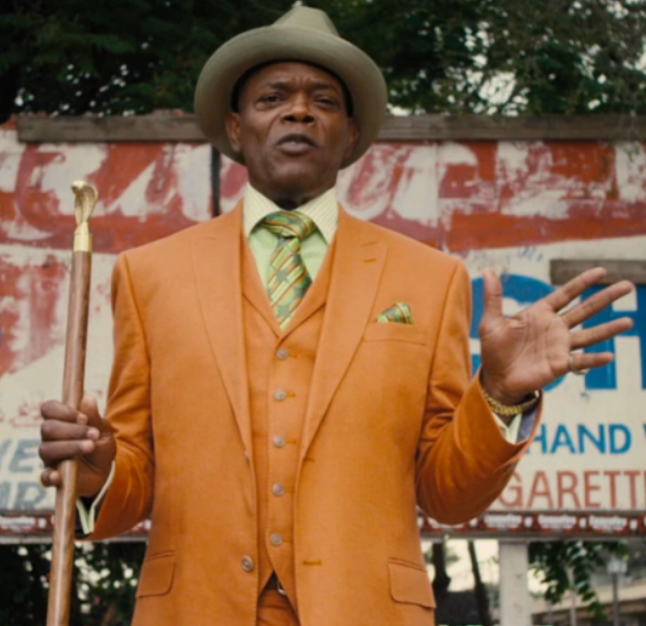 Nobody crafts an opening credits sequence like Shelton “Spike” Lee. In “She’s Gotta Have It,” photo stills of old-school Brooklyn are accompanied by his father, the legendary jazz composer Bill Lee. BK local Rosie Perez busts out her hip hop-boxing moves to Public Enemy’s “Fight the Power” at the start of “Do the Right Thing.” “Clockers” starts with a montage of taped-off Gowanus crime scenes as Marc Dorsey sings “People in Search of a Life.” Kids run through the Crayola-hued streets of 1970s Fort Greene as The Stylistics sing “People Make the World Go Round” in “Crooklyn.” “Da Sweet Blood of Jesus” begins with the gorgeously fluid dancing of Charles “Lil Buck” Riley set against the Red Hook waterfront. It’s one of the auteur’s many signatures: that big, beautiful heart worn proudly on his sleeve from the moment he fires each film’s starting pistol.
Nobody crafts an opening credits sequence like Shelton “Spike” Lee. In “She’s Gotta Have It,” photo stills of old-school Brooklyn are accompanied by his father, the legendary jazz composer Bill Lee. BK local Rosie Perez busts out her hip hop-boxing moves to Public Enemy’s “Fight the Power” at the start of “Do the Right Thing.” “Clockers” starts with a montage of taped-off Gowanus crime scenes as Marc Dorsey sings “People in Search of a Life.” Kids run through the Crayola-hued streets of 1970s Fort Greene as The Stylistics sing “People Make the World Go Round” in “Crooklyn.” “Da Sweet Blood of Jesus” begins with the gorgeously fluid dancing of Charles “Lil Buck” Riley set against the Red Hook waterfront. It’s one of the auteur’s many signatures: that big, beautiful heart worn proudly on his sleeve from the moment he fires each film’s starting pistol.
Relatively speaking, the opening credits sequence of “Chi-Raq” is pretty straight-up. I suspect this is not just because it is set in Chicago but because Spike is grinding his biggest axe since 2006’s very fine “When the Levees Broke: A Requiem in Four Acts,” which channeled the righteous anger of New Orleans residents after Hurricane Katrina. In bold, primary hues, the lyrics of “Pray for My City” – It’s Chi-Raq and my city’s lost/ I can’t fall victim to Satanflash – flash across the screen as they’re rapped by Nick Cannon, who plays the film’s titular character, the head of a fictional gang known as the Spartans. His street moniker stems from Chicago’s insidious nickname, which references that the number of the city’s homicides surpasses the number of American soldiers dead in Iraq.
It’s not a coincidence that the Spartans share their name with the bad-ass city-state of Ancient Greece. This film is a spoken-word, loose-as-a-goose musical adaptation of Aristophanes’ 411 B.C. comedy in which women refuse sex until their warring men declare a truce. In Lee and co-writer Kevin Willmott’s script, female ringleader (and Chi-Raq girlfriend) Lysistrata’s avowal to “never extend my Persian slippers toward the ceiling” becomes “total abstinence from knocking the boots.” Rest assured that when Teyonah Parris’s radically ripe Lysistrata struts through the streets popping cleavage, a Foxy Brown ‘fro, and boots-made-for-walkin’, you understand just how high a price she’s exacting.
Not that we have to figure that out for ourselves. “She’s got a mind like Einstein and a luscious behind,” rhymes narrator Dolmedes (Samuel L. Jackson), a jive-talking Greek chorus cum “Welcome to the Apollo” master of ceremonies who swaggers onscreen whenever our tears replace laughter. (At the downtown Brooklyn screening I attended, he triggered a gloriously Pavlovian fit of giggles every time he came on screen.) And the tears really do flow here. It’s only after her house is torched and a neighbor’s daughter is killed by a stray bullet that Lysistrata convinces the girlfriends of Spartan members to join a sex strike with the girlfriends of their rival gang, the Trojans, who are led by an eye-patch-sporting Cyclops (Wesley Snipes, winking whenever he mentions prison time). The dead girl’s mother (Jennifer Hudson, operatic on every level), neighborhood elder Miss Helen (Angela Bassett, in her fiercest and funniest turn since “Waiting to Exhale), and local preacher Reverend Mike (John Cusack, honoring his Chi-Boogie roots) also transform their grief into activism (albeit of a more conventional nature) and soon the “no-peace-no-piece” protest has achieved an international platform. Global blue balls, at your service.
Some have complained that the film’s broadly satiric tone makes light of the serious blight gripping Chicago right now. Others object to the gender polarity of this premise, in which men are drooling dogs and women are the sexually objectified moral gatekeepers of their community. I suppose all this is true. From “Do the Right Thing” to the criminally underrated “25th Hour,” Lee has bitten off more than he can chew in all his best work, and female bodies have triggered his greatest narrative confusion (to put it nicely). Frankly, I’d mind more if these agitprops didn’t stem from his unbridled passion to tackle social topics that rarely get airtime. I’d also mind more if that passion didn’t extend to a leonine celebration of all art forms – music, fashion, dance, and, of course, the street theater of daily urban life. A “more the merrier” ethos and esthetic reign in his films, which compel us to feel our feelings – lust, rage, sorrow, and, ultimately, love – “by any means necessary,” as he likes to say (via Malcolm X). With zigzagged flair, Spike wakes us up, which may be the best thing art can do in our Dissociation Nation. A wild-eyed, bumpily syncopated symphony in purple and gold, “Chi-Raq” is ragged and binary, for sure. It also is colorful in every way that our culture needs right now.
This was originally published in Word and Film.
